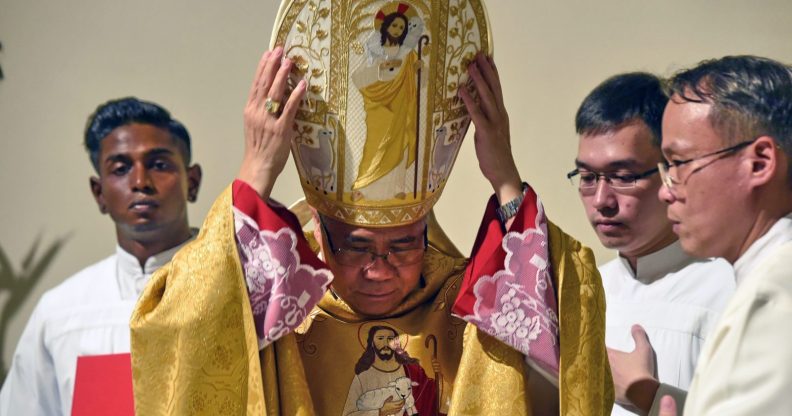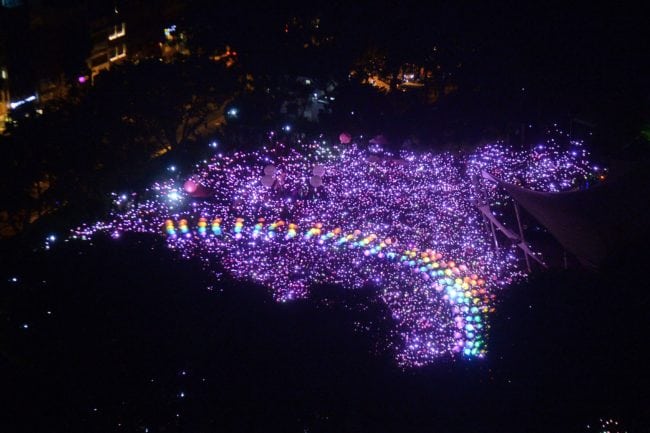Gay sex ban shouldn’t be repealed, Singapore Archbishop says

Archbishop William Goh Seng Chye (2nd L) performing Rite of Dedication at the Roman Catholic Cathedral of the Good Shepherd 120th anniversary in Singapore (Roslan Rahman/AFP/Getty)
The Archbishop of Singapore has issued a warning against the repeal of Section 377A, which criminalises gay sex, on the basis that it would lead to a “slippery path of no return.”
Archbishop William Goh published the pastoral letter on the website of the Roman Catholic Archdiocese of Singapore on Tuesday (September 18), describing the choice to repeal or not repeal as a “conscientious decision.”
The letter to Singaporean Catholics comes after India’s Supreme Court declared Section 377, a law imposed under British colonial rule, illegal in a landmark decision on September 6.
A petition calling on Singapore to keep the country’s similar provision gathered 65,000 signatures in the aftermath of India’s decision, even though thousands of people have rallied in Singapore in support of LGBT+ rights in recent years.
Goh sided with those who believe that the island state should not follow India in those footsteps, even if—he wrote—he sympathises with LGBT+ Catholics.
“I feel with them when they are ostracised or marginalised by society. They too deserve to be loved and treated with dignity and respect,” he said.
“On the other hand, I share the anxieties and fears of those who subscribe to the traditional and scriptural views of marriage and family, that repealing S377A would lead the country down a slippery slope.”
Singapore’s Minister for Education Ong Ye Kung stated last week that the country does not discriminate against LGBT+ people, but rights activist Rachel Yeo has previously told PinkNews that, even if Section 377A is rarely enforced, its existence gives a “sense of uncertainty” to LGBT+ people.

Badges condemning Section 377 of the Indian penal code (Indranil Mukherjee/AFP/Getty)
In his letter, Goh argued that decriminalising homosexual acts would lead to demands for further LGBT+ recognition that, according to him, would be dangerous for society.
“It would only embolden the push to legalise same-sex unions, adoption of babies by same-sex couples, surrogacy, and even the criminalisation of those who hold contrary views of marriage and who oppose same-sex unions,” he wrote.
The archbishop goes so far as saying he would not oppose repealing the law if it would just mean that LGBT+ people no longer faced criminal charges, but he is too wary of what would come next.
“By accepting homosexual acts as a social norm, the dreadful consequences for the stability of our families, the well-being of our children, and the risks to the common good will be long-term and irreversible,” he wrote.

Supporters form a rainbow among lights at the annual “Pink Dot” event in a public show of support for the LGBT community at Hong Lim Park in Singapore on July 1, 2017 (Roslan Rahman/AFP/Getty)
Goh proceeded to claim countries that have recognised same-sex unions faced “dire consequences,” without providing any evidence in support of this view.
“Looking at the dire consequences for countries which normalised same-sex unions and the ramifications that followed, may we not repeat the mistake that others have made! I pray that we will not walk the slippery path of no return,” Goh wrote.

